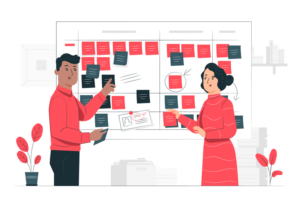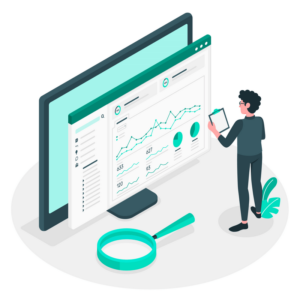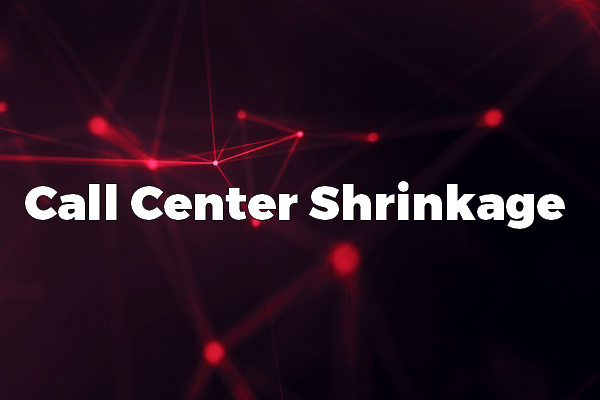Does your contact center have a dedicated team that’s ready and prepared to assist your customers at all times? This aspect makes all the difference in contact lead loss.
Assume your contact center employs 500 agents to answer incoming requests from your clients. Exactly how many of your company’s 500 employees are on calls? If the number of agents available to handle calls falls below the number of agents on break, meetings/training, on after-call work (ACW), absent or sick, then a call center efficiency loss has already occurred. When deciding on the size of your organization’s workforce, did you take this into account?
Contact centers require more than just assigning an agent to each phone; attrition also plays a role in determining how many agents are needed to service each client. The name of this metric and Key Performance Indicator is the Call Center Shrinkage.
In this article, we’ll examine the concept of Call Center Shrinkage, and how to quantify and control it. As well as how it impacts your contact center’s performance, and what you can do as a decision-maker.
What is Call Center Shrinkage?
 Call Center Shrinkage is a Key Performance Indicator that is calculated by dividing the number of agents currently serving clients by the number of agents that are unavailable at that moment..
Call Center Shrinkage is a Key Performance Indicator that is calculated by dividing the number of agents currently serving clients by the number of agents that are unavailable at that moment..
In terms of numbers, it’s the difference between the time you pay agents to assist consumers and the actual time they spend doing so. The shrinking distinction separates the two. There is a way to quantify the time agents spend not serving consumers. Different industries have different definitions, but they’re all close. Call center experts explain it as follows:
The performance of any scheduled or unscheduled performance duties that prevent an agent from attending to consumers.
What can prevent your agents from working efficiently?
While the gap between the number of agents hired and the number of agents available for your campaign is the main drive to shrinkage.
The lack of performance is also linked to the number of agents actively working or the number of hours wasted. That is why Call Center Shrinkage is commonly used as a planning tool to determine how many agents to recruit. The variables that lead to shrinking may be divided into two aspects or dimensions.
Internal Dimension:
- Group and one-on-one sessions for guiding or training
- Time spent without handling clients.
- Allowances for use of a facility on an unscheduled basis.
- Time devoted to offering assistance to a number of different organizations.
- Special projects and duties
Outside Dimensions:
- Holidays.
- Running late to work
- Sick time
- A lack of attendance for personal reasons
What proportion of shrinkage is tolerable for a contact center?
At this point, you might be wondering, what is an acceptable and typical shrinkage. Usually, Contact Centers are estimated to account for 30 to 35% shrinkage. In most cases, the shrinkage percentage is determined over a period of one year.
Shrinkage is a sign of poor performance since it indicates inefficiency. Customers will be less satisfied if employees aren’t available to help, which will lead to longer hold periods and higher wait times. A manager could look at total customer satisfaction in terms of shrinkage even if that’s not a formal performance indicator. A drop in total output might be caused by increased shrinkage rates placing an excessive burden on other agents.
Managers can determine the number of agents needed to handle incoming and departing calls by calculating shrinkage. In order to fulfill predetermined service objectives, managers take shrinkage into consideration. Managers must keep a close eye on this statistic to make sure they have enough employees and that the call center as a whole is running efficiently.
The formula for Contact Center Shrinkage
Call Center Shrinkage Formula may be calculated using two different methods: one to determine staffing needs, and the other to gauge how well individual agents are performing.
Call center shrinkage is calculated using the following formula:
Shrinkage = (Number of Agents Needed to Handle Clients/Number of Agents Available) x 100
Or
Shrinkage = ((Total Hours of External Shrinkage + Total Hours of Internal Shrinkage)/Total Hours Available) x 100
How to keep Shrinkage under control?
 Call center shrinkage may be tracked manually but as you guessed it, this will take too much of your time. Instead, you can simply manage it with a Cloud Contact Center Solution. This type of solution will help in determining when, how, and where shrinkage can occur, as well as how to minimize it. As it will assist you in maintaining an effective plan for reducing shrinkage and monitoring it on a regular basis.
Call center shrinkage may be tracked manually but as you guessed it, this will take too much of your time. Instead, you can simply manage it with a Cloud Contact Center Solution. This type of solution will help in determining when, how, and where shrinkage can occur, as well as how to minimize it. As it will assist you in maintaining an effective plan for reducing shrinkage and monitoring it on a regular basis.
However, you should know that no matter what you do, or what cutting-edge technology you have, you can’t avoid all causes of shrinkage. Given that most meetings take place between 8:00 am and 4:00 pm, you may discover that shrinking is greatest within those hours. This may be avoided by carefully planning the workplace space and layout. Some teams may also have a high rate of shrinking due to the high pace of taking care of clients. By examining this information, you’ll be able to see which procedures may benefit from some updates. Also, you may assign staff to stick to your agent’s schedule by determining what causes them to take longer breaks.
Skill Based Routing
Workforce Management features are now standard in most Cloud Contact Center Solutions. It is considerably faster and more efficient to utilize this solution to automate the shrinkage monitoring process than it is to deploy a traditional Excel spreadsheet method. In order to schedule agents and even allow them to create their own timetables, you can use skills-based routing in order to improve the agent experience. Simply, by reducing waiting periods for clients and directly connecting them to agents with the most efficient skills to answer, you can reduce your Call Center Shrinkage.
Ongoing monitoring
We said before that this KPI is usually calculated over a period of 12 months. However, if you want to have an efficient organization, it should be an ongoing activity. Shrinkage is a factor in your company’s overall efficiency, therefore improving performance necessitates keeping the shrinkage rate consistent. New-age contact center solutions allow you to measure it continually, which is necessary if you want to reach this goal.
Different metrics such as call volumes, service level objectives, and average handling time can be used to quantify shrinkage. Variations in these metrics have a direct influence on shrinkage, so keeping an eye on them can help you figure out what’s causing it.
Taking action against absenteeism
Now you might think that absenteeism is an external factor outside of your scope. But you have some influence over it. Supervisors and managers can spot agents who are regularly absent from the office and take action. In order to comprehend the concerns and complaints of agents, managers should hold frequent one-on-one meetings with them. You may address absenteeism by providing them with feedback on how to overcome their unhappiness with the work they’re performing.
Keeping your agents engaged
Imagine that you have to deal with clients that ask the same questions over and over. Tiring, right? This is what agents deal with on a regular basis, so you must keep them happy and engaged. In addition to training and mentoring, you may put in place a rewards program to show your appreciation for the hard work your agents put in. Another approach to keep them competitive is to provide incentives. Today’s call center systems include gamification features that boost staff morale and motivation. Leaderboards, badges, and actual presents like trophies are all examples of motivating your agents.
Segmentation is a must
Indeed, within your contact center, shrinkage rates vary widely from department to department and from team to team. It is critical to avoid a flattening rate across your entire company.
In that regard, create a prediction for a month in advance and compare it with the actual results to make shrinkage management an ongoing activity. Investigate the core causes of shrinkage issues including absenteeism, lengthier breaks, and other things you can control, and take steps to remedy them. This is how you keep the shrinkage rate under the industry norm of 35% by segmenting it for each department and team.
Conclusion: Performance measures under ongoing scrutiny
 As you understand now, a Contact Center’s overall operational performance may suffer if shrinkage is not closely managed. Keep a solid plan in place to assist you to track and cut down on the number of shrinking hours in your organization on a regular basis. Use the most up-to-date technologies to keep your company’s performance from shrinking.
As you understand now, a Contact Center’s overall operational performance may suffer if shrinkage is not closely managed. Keep a solid plan in place to assist you to track and cut down on the number of shrinking hours in your organization on a regular basis. Use the most up-to-date technologies to keep your company’s performance from shrinking.
The shrinkage rate must be measured, reviewed, and reduced on a regular basis by decision-makers. It’s essential to keep shrinking management in place by making a one-month allowance for shrinkage and comparing the prediction to the actual results. They also need to figure out what’s causing the shrinking so they can take steps to get it down to 35% and below.
There is a clear correlation between your productivity and shrinking. However, the exchange rate fluctuates from time to time. Customer satisfaction and service goals can only be improved by periodically measuring and monitoring the pace at which they are being met. If you want to see consistent shrinkage of internal and exterior shrinkage hours, you must keep implementing a strong approach.
NobelBiz is a world-class Telecom and CCaaS firm with 20 years of expertise offering full contact center solutions throughout the world. An experience that allows understanding of what is at stake for decision-makers when it comes to metrics and keeping performances.
Our NobelBiz OMNI+ cloud contact center software offers a unique combination of capabilities, including Omnichannel, Impressive API connections, and precise management of all your inbound and outbound Key Performance Indicators. Also, our NobelBiz Voice Carrier Network is the first telephony solution designed from the bottom up to service contact centers, providing the most adaptable set of smart technologies to enhance your contact rates, and conversion rates and minimize the effects of call tagging and blocking, all while ensuring overall compliance.

Michael McGuire is a contact center industry expert with almost two decades of experience in the space. His experience includes roles as Director of Contact Center Digital Transformation at NobelBiz, and as Director of Operations at FLS Connect, managing multiple call centers. As President of Anomaly Squared and Targeted Metrics, Michael successfully transitioned companies into remote operations and significantly boosted revenues. With a strong background in customer service, leadership, strategic planning, and operations management, Michael excels in driving growth and innovation in the call center space.
Mike is also a proud Board Member for R.E.A.C.H Trade Group, promoting consumer protection and satisfaction and Co-host of the Off Skripted Podcast – a show about Life, Call Centers and everything in between.







